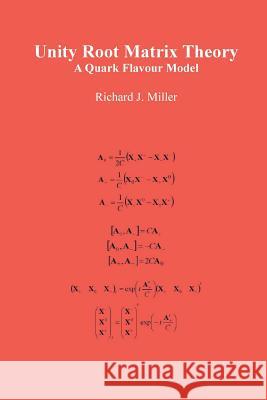Unity Root Matrix Theory: A Quark Flavour Model » książka
Unity Root Matrix Theory: A Quark Flavour Model
ISBN-13: 9781787192126 / Angielski / Miękka / 2016 / 460 str.
This book presents an integer-based representation of the quark flavour model using the mathematics of Unity Root Matrix Theory (URMT). As per a conventional quark representation, the quarks are given by eigenvectors to matrix operators, with commutation relations amongst these operators being those of the symmetry groups SU(2), for an up and down quark isospin representation, and SU(3), for an additional strange quark. The URMT method of lifting then extends this to a full, six-quark model, SU(6). Unlike conventional physical theory, the work originates in the world of number theory and Diophantine equations, and is based upon the invariance of an eigenvector equation to parametric variation in the unity root matrix - its elements are unity (or primitive) roots. The quark eigenvectors are Pythagorean or hyperbolic in nature, and parametrically evolve in both the time and frequency domain, whilst keeping all their inner product relations invariant, i.e. the model possesses unitary properties equivalent to the special unitary groups SU(2) to SU(6). Following previous publications on recasting physics in the world of number-theory, URMT has shown, once again, that the physical world may well be reducible to a simpler scheme that dances to the tune of the integers.
This book presents an integer-based representation of the quark flavour model using the mathematics of Unity Root Matrix Theory (URMT). As per a conventional quark representation, the quarks are given by eigenvectors to matrix operators, with commutation relations amongst these operators being those of the symmetry groups SU(2), for an up and down quark isospin representation, and SU(3), for an additional strange quark. The URMT method of lifting then extends this to a full, six-quark model, SU(6).Unlike conventional physical theory, the work originates in the world of number theory and Diophantine equations, and is based upon the invariance of an eigenvector equation to parametric variation in the unity root matrix – its elements are unity (or primitive) roots. The quark eigenvectors are Pythagorean or hyperbolic in nature, and parametrically evolve in both the time and frequency domain, whilst keeping all their inner product relations invariant, i.e. the model possesses unitary properties equivalent to the special unitary groups SU(2) to SU(6).Following previous publications on recasting physics in the world of number-theory, URMT has shown, once again, that the physical world may well be reducible to a simpler scheme that dances to the tune of the integers.











